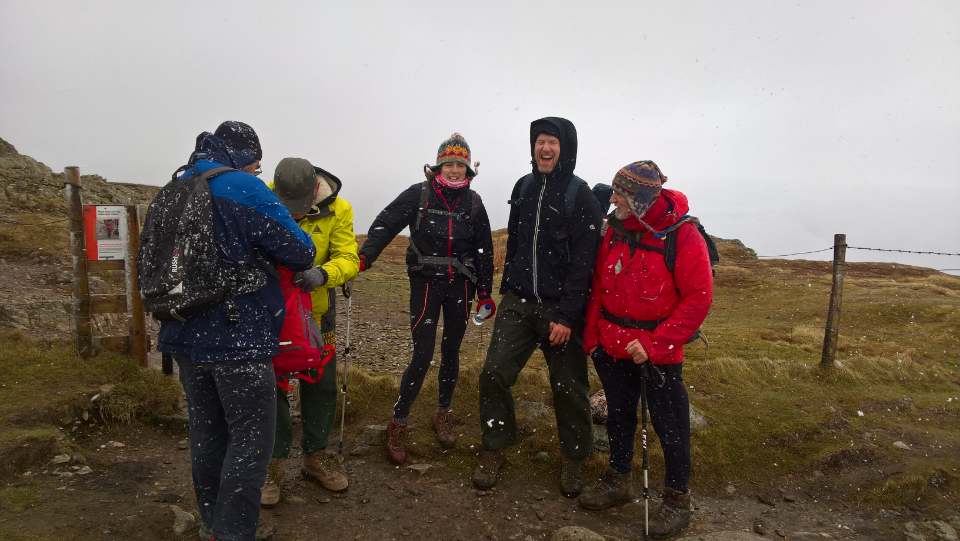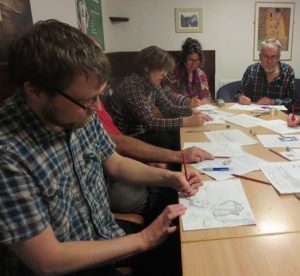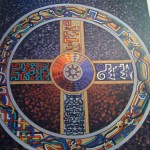The Middle Way Society is now five years old! It had its first origins in a retreat where five people got together for five days in my house in Malvern, in late August 2013. Those five people had got to know each other in the context of secular Buddhism. On that retreat, as well as us all practising together, I tried to share some of the ideas about the Middle Way as a framework for thinking, ethics and practice that I had been developing since the late 1990’s. Barry Daniel describes his experience of this retreat here. At the end of it I proposed the founding of the society, and it was agreed.
The society aims to support the development both of the idea of the Middle Way as a principle of judgement, and of the practice of the Middle Way. These two aspects of the work of the society are thoroughly interdependent, though the former is more distinct from what other organisations are doing. We are not aiming to create a new religious group, but rather a support group that is compatible with a Middle Way interpretation of any religious (or philosophical, political, scientific, or other) tradition.
The first post on this website was a simple welcome put up on 8th Sept 2013. Since then there have been 140 podcasts, hundreds of blogs (the majority by me, but also by Jim Champion, Rich Flanagan, Peter Goble and others), 32 book reviews, further audio-visual material including a set of 30 introductory videos to Middle Way Philosophy, and a number of other pages intended to introduce Middle Way Philosophy. But the website is not the only focus of the society’s activities. We have held 14 retreats so far at various venues around England, led by me, Nina Davies and Barry Daniel. We also have an ongoing Skype discussion group and a Skype meditation group. We have an active YouTube channel, with more than 1200 subscribers, a Facebook page where quotations and helpful links are frequently posted, and an active Twitter account.
The society has grown slowly during these 5 years, and of course, like any organization, had some setbacks and difficulties. However, its wider influence has probably grown more swiftly than its actual membership. Many of the podcasts have been with relatively well known people (for instance Stephen Batchelor, Iain McGilchrist, Daniel Siegel, Sangharakshita, Daniel Goleman, Don Cupitt, Karen Armstrong, Jonathan Porritt, Ed Catmull, Stephen Jenkinson) and this has helped us to make connections between their areas of interest and the Middle Way, which sits in between them all. If a few thousand more people have heard of the Middle Way and might possibly consider it as a genuine option, when it wasn’t previously on their agendas at all, then I feel we have achieved something.
I am proud of what we have achieved in five years, even though it has sometimes felt like slow going. But there is a long, long way to go before a significant number of people even start to think of the Middle Way as a viable option. There are many individuals and movements that use the Middle Way implicitly in certain areas of belief or practice, but so far very few indeed that use it explicitly and recognise its potential. The thing we need most is more live events that help to develop a sense of community, where people are able to engage in more depth with what the Middle Way might mean for their lives. We also need more people to join the society and play a more active role in making effective live events happen.
The rest of this post gives some testimonies from three other people who have been closely involved with the society: Julian Adkins, Peter Goble and Susan Averbach.
Robert M. Ellis (Malvern, UK)
The metaphor of a middle way is used widely and so, perhaps like all of us, I have been exposed to it in different contexts for most of my life. However, it became more philosophically meaningful for me in the course of attending secular Buddhist retreats and reading related books – especially those by Stephen Batchelor. These teachings related to charting a middle way through life were much more than a benign appeal to moderation in all things, but rather a pragmatic response to radical scepticism about we can know with certainty and what that even means.
Having been a casualty of religious dogmatism at a very personal level, this is what I needed to enable me to continue to engage with a tradition I found meaningful and yet of which I was also deeply suspicious – and remain so.
It was against this background that I was introduced to Robert Ellis’s work through Barry Daniel, a mutual friend, and attended the first residential gathering of what has now become the Middle Way Society – generously hosted by Robert himself at his home in Worcestershire.
I hope my reading and involvement since has deepened my appreciation of these ideas and related practices. Indeed, it is my faltering attempts to actually practice a middle way that I value most. I still resist giving a middle way the definite article, although for convenience I often do. Perhaps this is just my own contrary nature, but perhaps it is also my own way of focusing on the metaphor of navigation; a way of proceeding rather than a specific route. As soon as I start thinking that this route is right and another is wrong, I am straight back into that black and white thinking that a middle way of doing things defies.
Of course some routes are better than others, but if I can get along the road without ending up in the ditches on either side, I’m doing okay. If I ever think I know exactly where the centre is, I am probably already in one of those ditches!
Five years since its inception is a wonderful opportunity to say thank you to the Middle Way Society; to Robert; to Barry and all those who have contributed and those who continue to do so. Thank you all.
Julian Adkins (Edinburgh, UK)
The Middle Way has internalised itself in me as a guiding principle in all my relations, with ‘myself’, with ‘other people’, and with the ‘world outside’. I am less at odds with all of ‘those things’, and the ‘connections’ I thought to have made with “every’ ‘thing’ have loosened.
I am generally less anxious and defensive.
I have been a very hard nut to crack. As when cracking a walnut, you can use a metal device, which may destroy the nut and its content, or you can use the flexed thumb as an anvil and the closed fist as a soft mallet, which does the job simply and cleanly, with practice and open-mindedly.
The Middle Way is like the latter approach, I think. But I think we may need to find other ways of sharing it more widely for it to gain traction and utility in an information- and technology-glutted world. The answer(s} elude(s) me, but beckon(s) on the periphery of my consciousness, and I acknowledge it/them.
I recently heard that the Incas knew how to use logs to move great stones, but never invented the wheel (as far as can be known from historical records and artefacts). I feel we may be at that point with the Middle Way, and I hope we are right, and that the penny will drop soon!
Peter Goble (Normandy, France)
Being actively involved with the Middle Way Society, taking classes, hearing podcasts, reading blog posts, and general discussions about middle way approaches to our everyday dilemmas, has changed me for the better. I am more open to various religious practices and thoughts. I am more able to hear points of view that differ from my own, mainly because I realize that my opinions are provisional and based upon my own experience. In avoiding absolutes I am more able to ask the right questions of those who are entrenched in absolutes. If more people learned a middle way approach we’d be less divided and would be able to create a more just and loving society.
One bonus benefit of becoming versed in middle way thought is that I now have a greater appreciation of Judaism, which I think, encourages reflection and debate, especially around biblical narrative. The shared study and analysis of the Bible and commentaries over the centuries has offered a tool that has been and continues to serve an integrative purpose for many, somewhat similar to a middle way approach, in my opinion.
Susan Averbach (San Francisco, US)
Pictures are taken from Middle Way Society Retreats: 1. Walking Retreat in the Lake District 2018, (2) Meaning Retreat at Telscombe, Sussex in 2014.



